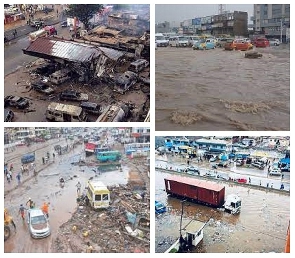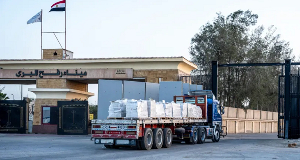On Wednesday, June 3, 2015, it was business as usual when Ghanaians set out to engage in their normal economic activities.
Before what turned out to be one of the country’s greatest disasters of all time was a normal rainy day. But as typical of June/July in Ghana, the rains were expected. However, that expectation was not adequately prepared for just in case.
The capital city, Accra is well known for experiencing floods during the rainy seasons, but the knowledge of that did not save lives and properties on that fateful night.
On June 3, the heavy downpour caused traffic and floods at the Kwame Nkrumah Circle where a lot of commuters converge or use as a center to their various homes.
The situation was aggravated when a fuel station exploded during the heavy downpour. The fuel station which served as a shelter for some persons during the rains turned into the place where they took their last breath.

The flood situation in Accra
Almost 53,000 people in Ghana were affected by flooding after this event which caused major damages and losses in the housing, transport, water, and sanitation sectors amounting to $55 million, with an estimated $105 million reconstruction cost.

The ruins after the June 3rd disaster
Apart from June 3, the flood situation here in Ghana has claimed so many lives and millions of Ghana cedis worth of properties.
It’s been 8 years since that fateful and dreadful night that claimed lives and properties. But are there any visible, notable, and intentional plans in sight against an unforeseen disaster like June 3?

Climate change and translating effect on weather patterns and rainfall:
In recent times, climate change can be said to have contributed to the heavy and irregular rainfall patterns being experienced throughout the country.
Indeed, experts say that some activities of humans have contributed to the depletion of the ozone layer which has massively altered weather patterns leading to extremes in all cases.

Senior Meteorologist at the Kotoka International Airport, Raphael Boakye, speaking to GhanaWeb on the subject, highlighted some of these activities that have contributed largely to climate change.
According to him, the felling of trees and the destruction of Ghana’s forest is one of the major contributors to the concentration of carbon dioxide in the atmosphere.

He explained that chopping down trees without replanting also means that there is less absorption of the rain by these plants and a direct impact on the environment.
He also highlighted the role of industrialization and the increasing number of factories and economic activity that has further exacerbated the country’s vulnerability to climate change, through the emission of pollutants and greenhouse gases.

The result of this, according to Raphael Boakye, is the current situation where there is increased rainfall and excessive levels of drought in Ghana.
This means that there is more rain than usual in recent times and this results in floods in many parts of the country.
He explained that rising sea levels which are also resultant of climate change also increase Ghana’s vulnerability to flooding.

How floods come in:
The problem not only ends with the harsh impact of climate change on weather patterns but its translating effects on the livelihoods of persons living in Ghana.
Already, the building and planning system and other factors including indiscriminate disposal of waste in Ghana make it such that many parts of the country are prone to flooding even with very little amounts of rain.
What this means is that with the heavy rains and longer periods of rain, Ghana is at high risk of many floods leading to loss of lives, properties, and livelihoods.
When it rains, drains become choked, homes are flooded, and streets are taken over by flood waters.
The growing impact of climate change means that the issue of flooding must be checked and adequately prepared for.
The way forward:
It is crucial for measures that can mitigate climate change effects to be highlighted while highlighting how Ghana can well prepare to avert any unforeseen flooding situations that could see a repeat of the June 3 incident.
Even though Ghana receives support in times of distress when the floods come, it will cost less if the factors that contribute to the floods are tackled from the roots.
In an exclusive interview with a Road and Buildings Consultant, Ing Abdulai Mahama noted that despite the fact that there is very little that Ghanaians can do to reverse the depletion of the ozone layer Ghana must focus on ensuring that its retention channels are adequately prepared.
He said: “We have to acknowledge that with the depletion of the ozone layer, we are getting higher precipitation which hitherto was not the case across the globe, some countries use not to experience flooding but in recent years, they are all experiencing massive flooding. What can we do to help the ozone layer? We cannot do anything but what we can do in our country is to actually focus on getting our channels and retention adequately accommodative.”
According to him, District Assemblies must take the construction of retention ponds seriously in order to allow rain to take its free course and flow properly.
“With the Construction of the 18-number retention pond contained in the Auditor-General’s report last two years, we were supposed to construct an 18-number retention pond so that when Ghanaians properly design their houses and allow water to flow through their natural channels these receptors will take them into their bosom,” he said.
He also added that due to the fact that these retention ponds have not been constructed, even when there are good designs, the problems still remain unresolved.
“But in this case, those channels have not been done yet so you can do a proper design but the end of the journey is not ready to receive that volume of water, so it is obvious that the challenge is coming from indiscriminate building of houses in water courses.
“There are so many beautiful laws that have been passed in recent times. One of them has just been revised which is LI 16 30 to LI 24 65 the National Building regulation and this explicitly says what the Assemblies must do to ensure that we don’t get some of these pocket floods which have become so big in the country currently,” he bemoaned
On the role that individuals can play in order to prepare adequately for floods, he noted that they may be constrained in adequately preparing since the authorities are expected to enact the laws that bound the construction of the right channels.
Ing Mahama said persons who are looking to build or rent must employ the services of engineers in order to get expert opinions on the right areas and plans that will be helpful.
He advised that “if you going to construct or put up a building you must hire the services of professionals to look at the terrain. The topography of the area will determine if the building must go high or not so that in case the area is flood-prone you would be protected.”
The engineer also encouraged Ghanaians to save themselves from the headache of bad planning and its associated risks by hiring professionals to supervise their projects.
Finally, he admonished all Ghanaians to instead of paving their homes or buildings with pavement that will not be able to soak enough water when it rains choose greener options.
He noted that if “even 10 homes have green grass that can each hold up to 100 litres of rain, imagine how many litres will be soaked in times of heavy rains.”
With all these measures in sight, it is up to the relevant stakeholders to pick up the mandate and do their expected duties in order to safeguard the country from any unforeseen June 3.
This report was completed as part of the Centre for Journalism Innovation and Development‘s 2023 Climate Change Fellowship with funding support from the Centre for Investigative Journalism’s Climate Change in News Media project.
General News of Friday, 23 June 2023
Source: www.ghanaweb.com













